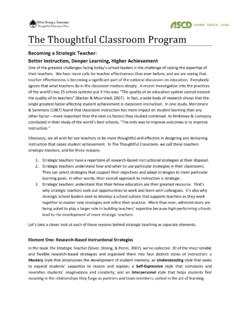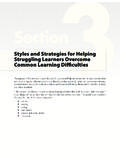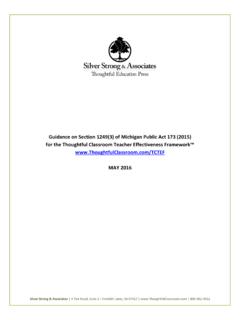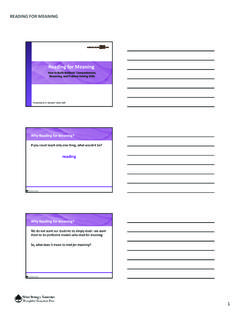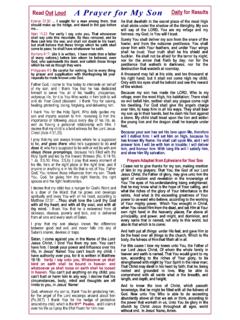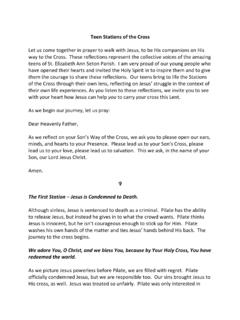Transcription of SAMPLE LESSONS: READING FOR MEANING - Thoughtful …
1 SAMPLE LESSONS: SAMPLE LESSONS: SAMPLE LESSONS: SAMPLE LESSONS: SAMPLE LESSONS: READING FOR MEANINGREADING FOR MEANINGREADING FOR MEANINGREADING FOR MEANINGREADING FOR MEANING227 First StreetHo-Ho-Kus, New Jersey The Power of Purposeful Readingby Cris TovaniAs a teacher, what do you do to ensure that your students aresuccessful when you assign them a READING ?Before you read the text read the following statements on the next page and putan A if you agree or a D if you disagree with it. Then read the text todetermine if the author would agree or disagree with the statement. Find evidencein the text to support your position. Meet with a READING Club to share yourevidence. Try to reach consensus on whether the author would agree or disagreewith the statement by citing the evidence in the text. If your READING Club cannotreach a consensus, try to revise the statement so that all members can agree read well requires students to make connections between what theyread and their previous knowledge of Power of Purposeful READING Support Refute Support Refute Support RefuteBEFORE AFTERWhen it comes to establishing a purpose for READING , I would agree withthe statement: It s more important to teach a person how to fish forfood than to give him fish to eat.
2 If you can t figure out what is important in a text then you can t comprehend Power of Purposeful READING My Ideas Author s IdeasBEFORE AFTERThe best ideas for helping students find important ideas in READING Support Refute A fake purpose is better than no purpose at all. Support Refute Support RefuteThe greater the student s background knowledge the less clear theteacher needs to be about the purpose for the READING . Importance like beauty is in the eye of the mouse told his mother and father that he was goingon a trip to the seashore. We are very alarmed! theycried. The world is full of terrors. You must not go! I have made my decision, said the mouse firmly.
3 Ihave never seen the ocean, and it is high time that I can make me change my mind. Then we cannot stop you, said the mother andfather mouse, but do be careful! The next day, in the first light of dawn, the mousebegan his journey. Even before the morning had ended, themouse came to know trouble and cat jumped out from behind a tree. I will eat you for lunch, the cat was a narrow escape for the mouse. He ran for his life, but he left a part of histail in the mouth of the afternoon the mouse had been attacked by birds and dogs. He had lost his wayseveral times. He was bruised and bloodied. He was tired and evening the mouse slowly climbed the last hill and saw the seashore spreading outbefore him. He watched the waves rolling onto the beach, one after another. All of thecolors of the sunset filled the sky. How beautiful! cried the mouse. I wish that mother and father were here to seethis with me.
4 The moon and the stars began to appear over the ocean. The mouse sat silently onthe top of the hill. He was overwhelmed by a feeling of deep peace and the statements before you read the story. Then read the story and collectevidence in the text either to support or refute the statement. Meet with a group ofyour classmates and share your evidence then decide as a group if you agree ordisagree with the Mouse At The SeashoreBEFORE AFTERThe author probably wants us to feel happy for the mouse. Support Refute Support RefuteWhen the end is good, even a difficult journey is worth mouse had no real reason to leave home. Support RefuteThe mouse thought he ought to go to the ocean. Support RefuteA or DEvidence ForEvidence AgainstAccording to Bacon, revenge is allowable under some or DEvidence ForEvidence AgainstA or DEvidence ForEvidence AgainstREADING FOR MEANINGM odel lesson : RevengeDirections: Review the statements that follow.
5 Then read the essay "About Revenge" that follows. Asyou read, indicate whether you agree or disagree (A or D) with each statement. Cite evidence for, and/or against each I: Reviewing StatementsBacon believes that the law should punish those who enact plots of revenge against believes all acts of revenge are would probably approve of Dirty Harry's notion of private justice and or DEvidence ForEvidence AgainstMy feelings about revenge are much like Francis Bacon' good moral for this essay would be: "It is much wiser to focus on constructive things than to worryabout wrongs committed in the past."A or DEvidence ForEvidence AgainstA or DEvidence ForEvidence AgainstOf Revengeby Francis BaconPhase II: Active ReadingPhase III: DiscussionIf you are working with others, take some time to discuss the READING , the statements, and your re-sponses to them*. Which statements caused the most difficulty? Which caused the most polarization ofthe group?
6 Can you come to any resolution on these statements?*If you are working alone, take this discussion time to reflect on the READING , the statements, and yourresponses. Which statements caused the most difficulty for you?REVENGE is a kind of wild justice; which the more man s nature runs to, the more oughtlaw to weed it out. For as for the first wrong, it doth but offend the law; but the revenge ofthat wrong, putteth the law out of office. Certainly, in taking revenge, a man is but even withhis enemy; but in passing it over, he is superior; for it is a prince s part to pardon. AndSalomon, I am sure, saith, It is the glory of a man to pass by an offence. That which is pastis gone, and irrevocable; and wise men have enough to do, with things present and tocome; therefore they do but trifle with themselves, that labor in past matters. There is noman doth a wrong, for the wrong s sake; but thereby to purchase himself profit, or pleasure,or honor, or the like.
7 Therefore why should I be angry with a man, for loving himself betterthan me? And if any man should do wrong, merely out of ill-nature, why, yet it is but like thethorn or briar, which prick and scratch, because they can do no other. The most tolerablesort of revenge, is for those wrongs which there is no law to remedy; but then let a man takeheed, the revenge be such as there is no law to punish; else a man s enemy is still beforehand, and it is two for one. Some, when they take revenge, are desirous, the party shouldknow, whence it cometh. This is the more generous. For the delight seemeth to be, not somuch in doing the hurt, as in making the party repent. But base and crafty cowards, are likethe arrow that flieth in the dark. Cosmus, duke of Florence, had a desperate saying againstperfidious or neglecting friends, as if those wrongs were unpardonable; You shall read(saith he) that we are commanded to forgive our enemies; but you never read, that we arecommanded to forgive our friends.
8 But yet the spirit of Job was in a better tune: Shall we(saith he) take good at God s hands, and not be content to take evil also? And so offriends in a proportion. This is certain, that a man that studieth revenge, keeps his ownwounds green, which otherwise would heal, and do well. Public revenges are for the mostpart fortunate; as that for the death of C sar; for the death of Pertinax; for the death ofHenry the Third of France; and many more. But in private revenges, it is not so. Nay rather,vindictive persons live the life of witches; who, as they are mischievous, so end IV: SynthesisIssues of the Day Magazine has asked you to write a brief (2-3 paragraphs) editorial that responds toBacon's argument by explaining your position on the role of private revenge in our society. They haveasked that your article address these questions: Is private revenge justified? If so, when? How shouldthe law react to people who enact revenge plots?
9 If possible, use some examples in your Problem StatementsMath Problem StatementsMath Problem StatementsMath Problem StatementsMath Problem StatementsRead the statements before you read the problem, then read the problem to determinewhether you agree or disagree with them, and why. Discuss your answers and resolve yourdifferences. Solve the problem then explain your work:1. Mr. Smith had more $5 bills than $1 The problem is asking you to find the total number of $1 bills and $5 If x equals the number of dollar bills in the problem than x+7 equals the number of 5 dollar bills in the We already know Mr. Smith s total register receipts for the The following equation can be used to solve the problem. x(1) + (x-7)(5)=T (Total)AgreeAgreeAgreeAgreeAgreeDisagree DisagreeDisagreeDisagreeDisagreeMrMrMrMr Mr. Smith check. Smith check. Smith check. Smith check. Smith checked his cash registered his cash registered his cash registered his cash registered his cash registerat the end of the dayat the end of the dayat the end of the dayat the end of the dayat the end of the day.
10 He found. He found. He found. He found. He foundthat he had seven fewer $5 bills thanthat he had seven fewer $5 bills thanthat he had seven fewer $5 bills thanthat he had seven fewer $5 bills thanthat he had seven fewer $5 bills than$1 bills, and no larger bills. In all,$1 bills, and no larger bills. In all,$1 bills, and no larger bills. In all,$1 bills, and no larger bills. In all,$1 bills, and no larger bills. In all,he had $ Fhe had $ Fhe had $ Fhe had $ Fhe had $ Find the numberind the numberind the numberind the numberind the numberof $5 and $1 bills:of $5 and $1 bills:of $5 and $1 bills:of $5 and $1 bills:of $5 and $1 bills:$$ Solve Problem Explain WorkAdapted from Kentucky Open Response 2004 8th grade READING for MEANING Strategy Read the problem and use the map below to help you respond to the statements.
